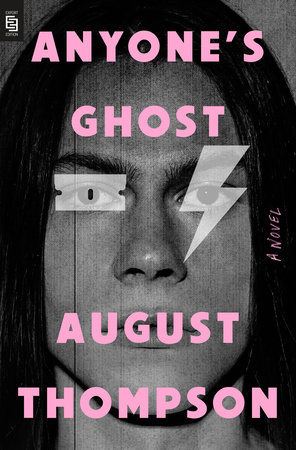PrologueIt took three car crashes to kill Jake.
I was there for the first two—one when I was fifteen and he was seventeen and we were driving like we shouldn’t have been, late and drunk at the end of our New Hampshire summer, the other six years later in a hurricane-thrashed Manhattan when we talked about death and fate as a kind of nervous foreplay.
I am standing in a heartless Airbnb in what I am told is downtown Fort Worth, looking out of the moony living room window. I can see the wings of the angels atop the Bass Performance Hall and the generic Southwestern roof of the Cheesecake Factory. I’m tying one on solo, drinking the Lone Stars I bought from Buc‑ee’s, my little way of honoring Jake. I can’t stop reading and rereading the details of the third and final crash on my phone, hoping, in that obscure, pathetic way, that the data on the
Arlington Citizen’s obit page will rearrange itself between reloads. The one song of Jake’s I still have, “NH, NH,” plays with tin‑can‑and‑string quality from my phone’s speaker. My therapist, Rebecca Piacentini, LCSW—I always call her “Doctor” out of reverent habit—says this type of indulgent behavior is “very much not a good idea.” It’s getting late enough to be early.
My Airbnb is a town over from tomorrow’s celebration of life. The celebration was planned by Jake’s mother, his useless father, and his widow, Jess, the woman I never wanted Jake to marry. I came here on a Klonopin‑warm flight to witness their grief and understand how it matches my own.
I can see my reflection, the pink scars on my face deepened by the uncanny blue of my phone. The obituary reloads. I am nearly thirty years old and this is the first obituary I’ve ever really read, and I can’t tell if that’s lucky or an indictment of the dead in my life.
I’m struck by how nonviolent and flat the language is.
Jake was thirty‑one. He was survived by his parents, his wife. He was loved. It’s odd, tonally so far from his personality. Do all obituaries play it safe, or do some become honest—“he bled out slowly, wishing for death”? Do obituaries ever have a sense of humor—“Jake died as he lived, staying up all night and fucking around”?
I know from other research, the rudimentary sleuthing I’ve become obsessed with—calls to the coroner’s office and reading up on the half‑life of amphetamines—that there was speed in his system under all that whiskey. And I keep thinking that maybe the crash wasn’t an accident but a natural coda to a thirty‑one‑year attraction to death.
My thoughts dilate.
I reopen the message that told me of the third crash—I can’t believe I’m telling you this—from an acquaintance I would have forgotten about completely if it weren’t for the internet’s insistence on keeping people around.
It makes sense, in its way, to have learned of Jake’s dying through a DM, that delivery system so efficient and impersonal and arbitrary. It matched the near‑silence he and I had kept up for almost a decade.
I rotate between looking at my phone and thinking about the lies I’ve told Louvinia—who I call Lou when I love her most. I’m afraid that maybe this is too much. That she’ll realize she’s been waiting for a full, present, nonexistent me. Even after all those times I promised there was nothing to wait for.
1 A month before I met Jake for the first time, I came home to a New Hampshire without women. It'd been a year since my mother had left my father and taken me to Venice, California. She hired a lawyer, and after months of mutual bloodletting, my parents reached a seasonal agreement. I was to spend my semesters in Los Angeles and my summers, from the last day of school to the night before Labor Day, in New Hampshire.
After my mother left, my two best friends, the neighbor girls from across the street, moved away. Without them, I can hardly remember any women that summer outside of the postal worker, waving as she drove past in her doorless Jeep. My house had always been a place of women-aunts, cousins, family friends. Now there was only a cat, my father, the brown-spotted Dalmatian Dr. Chips, and me. Theron David Alden-that talismanic namesake left from my grandfather-fifteen and still a year from a ten-inch growth spurt that would leave lipstick-purple stretch marks on my back and improve my quality of life profoundly.
Dad's new pickup idled in the little loading area at the Manchester airport. It was moss green and roughed up. I couldn't tell if this was a heightened affect-he'd long been obsessed with hiding the small wealth he'd accumulated from his one-man architecture firm, posturing with blue-collar locals as if he were "just one of the guys"-or if this was an evolution meant to reduce my mother's alimony. The Lexus traded in for a used pickup, the profit vanished. A kind of Cayman shuffle.
"How we doing, Davey boy?" Apparently, he'd picked up smoking again. His words came out gray, and he leaned over to pop open the passenger door. He threw a thumb back to the open bed of the pickup. I had a suitcase of band T-shirts and a pair of jeans.
I was exhausted. My flight east was convoluted, threading across the country, catching connections in Albuquerque and Philadelphia. I could've flown direct from LAX to Logan, adding an hour to my dad's drive, saving my mother money and grief. But Dad refused. He told my mother if I wanted to fly into Boston, I could figure out how to get to New Hampshire myself. This was the bland struggle my parents had developed, where victories weren't about how much one could win but how much the other could lose.
"It's David, Dad," I said as I climbed into the front seat, scooting the dog over. I hated being called Davey. We Aldens typically went by our middle names. Our first names were awkward New England traditions-a family tree of Wards and Esthers and Vernons and even one poor Ezekiel. For years I suffered under the diminutive-Davey, the negligible. After the age of seven, Davey felt like an insult. Even when accoladed David, I always felt detached from the averageness of these names. It was the basest of teenage needs, but I wanted something, anything, that would let me feel remarkable.
"What's this?" Dad said.
"What's what?"
"Why are you talking like that?"
"Like I normally do?" I lied. I'd started forcing my voice a half step lower than it was to sound more manly.
"Either you went through puberty on that plane ride or there's something wrong with you. Do I need to take you to the doctor?"
I ignored him and put my head to Dr. Chips. When I was a kid, I thought if I pushed my skull hard enough against his, he could hear what I was thinking. Now he seemed too old to notice anything. He had a pink pot belly and a hind hip he mothered.
My father had changed a lot in the nine months since I'd seen him, too. He wore a simplified wardrobe of matching denim and sported an Uncle Sam goatee-sure signs that a man has been unsupervised, and maybe unloved, too long. His face had become severe, his skin ruddied. He was thinner. He'd always been thin, but now he seemed depleted.
I was sad, though I'd never show it, that this was the grim calendar I'd live by now. Every nine months, I'd come see Dad lessened and the dog more tired.
As he drove down Interstate 93, Dad slapped my shoulder hard, four times in a row. His hands felt as big and leathery as catcher's mitts. "Glad you're here, boy. Are you happy to be back home?"
"I guess," I said.
Dad held a silence and then matched my pissiness. "Please, try to contain your excitement. I was hoping you'd be more fun to hang out with now that you're a bit older."
The weed brownies I'd made before my flight, following printed-out instructions from Erowid, were wearing off. My brain felt as if it were made of cotton candy. I thought of reaching into my backpack to retrieve another brownie, but the lame subterfuge required would be too much work.
Dad tapped the steering wheel with his thumbs, immune to the rhythm of the Bob Seger song he'd put on until he regained his enthusiasm. "Trust me. This is going to be a good summer. I can feel it."
"Which room do you think you'll want?" Dad said. "Lord knows we've got options." I knew the range of his laughs, from the rare in-need-of-a-ventilator gasping, which felt like a reward, to this one, which sounded porcelain and showy, the chatter of fake teeth.
"I don't care," I said.
"I'll set up the attic for you, if you want. It'd be like your own apartment up there," Dad said. "Could be cool. Or you could take the basement, if you want to round out this whole morbid vibe you've got going on."
"Whatever's chill," I said. To laugh at his jokes felt like a form of submission. I was determined to frown until September.
After a few minutes of thinking of something to say, Dad settled. He ran a hand through my shoulder-length hair and said, "Christ, they don't have showers in California?"
I shrugged away from him and wondered how thorough a process emancipation was. Dad turned up the radio and I was relieved. It was easier when neither of us tried.
After an hour, 93 gave way to 101, which gave way to Winona Drive. As we got farther down Winona, the distance between streetlamps grew. We passed through long stretches of true dark, where the trees became too tight for silhouettes.
Despite the dread of a summer spent alone, with nothing to do, knowing no one, nowhere to be, I felt a little thrill when, finally, we turned into our driveway and I saw the house I grew up in for the first time in almost a year. I smiled and hoped Dad didn't see.
Desperate to pee, I ignored Dad's "Davey, you better not spend the summer slamming the front door" and ran up to the attic room he called my apartment. I felt sick from the bacteria in my bladder-my body, without my knowing, was starting a lifelong partnership with prostatitis. Once relieved, I took off my Vans, ate two weed brownies, turned on the back end of the TBS rerun block I watched every night.
For the next three weeks, this was how I spent my evenings: From six to eleven, I could watch uninterrupted repeats of
Seinfeld, King of the Hill, The Simpsons. I slugged sodas and ate chips to further develop a body that looked as if it were sponsored by everything bagels.
During the days, I used the techniques my mother used as I was growing up. I learned the poles of every part of our property and banished myself to wherever my father wasn't. If he was in his office, I stayed in my attic. If he was by the pond, I'd move to lie in the moss-suntanned to an arsenic green-at the top of the hill that overlooked our property. Only night was all mine. I would get so stoned, I could barely talk, and I'd put on the oversize designer headphones I'd received as a guilt gift from Dad and listen to all of the music I needed so badly then, which stays with me now in the form of that eternal screech of memory, a nostalgic echo often misdiagnosed as tinnitus.
And then, of course, there was the masturbation. Slow-loading internet porn that built expectations of inflation-that my dick should be bigger, that my future-tense girlfriend should have giant tits, that I should anticipate a lifetime of high-volume, almost-fatiguing fucking. I was very careful to select the videos that showed as little of the guy as possible. If I came, accidentally, to the squint of the actor or when the camera cut to a lacrosse-ball bulge of a bicep, I felt as if I carried some mark on me. That that made me a faggot. That everyone knew how faggy I was. Then I'd eat more weed brownies until I fell asleep.
This early summer was a lot like my life in California. Walking around Venice, I was always alone and stoned, my few friends matters of convenience more than anything. Every morning before school, during lunch break, as soon as class was out, you could find me in the West Side's alleys, crouched behind full recycling bins. I smoked crude joints that looked like witches' fingers. My Discman spun used CDs I bought from Second Spin Records with the lunch money I saved from skipped meals.
Then I'd go to the pedestrian bridge just past the California Incline and look down at the PCH and its hundred-mile traffic as the horizon behind gave way from blue to pink to blue. I'd think about how each one of those cars was driven by someone with a life so full of detail that it exhausted, brought great joy, ruined. And I'd wish for any way to be them and not me.
Copyright © 2024 by August Thompson. All rights reserved. No part of this excerpt may be reproduced or reprinted without permission in writing from the publisher.








